EARLY CHILDHOOD DEVELOPMENT
From waste to toys – training practitioners in early learning programmes to create playthings from recyclables
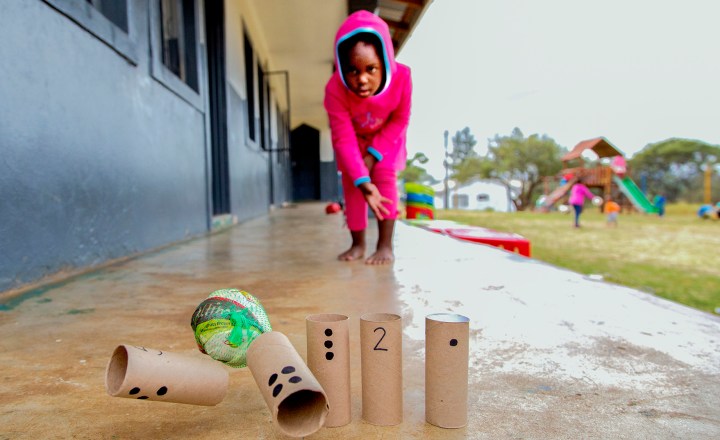
The Waste 2 Toys programme run by the non-profit Singakwenza is giving parents and practitioners in early learning programmes the skills to make toys and teaching aids from recyclable materials.
The non-profit organisation Singakwenza, meaning “We can do it”, is striving to make early learning accessible to as many children as possible. Through Waste 2 Toys training workshops, it is providing parents, early childhood development (ECD) practitioners and community workers with the skills to make their own toys and teaching aids using recyclable materials.
The organisation is based in Pietermaritzburg, KwaZulu-Natal, but has run workshops throughout South Africa, as well as in Zambia, Zimbabwe, Botswana, Malawi and Swaziland, according to Julie Hay, its founder and executive director. About 70 workshops take place each year.
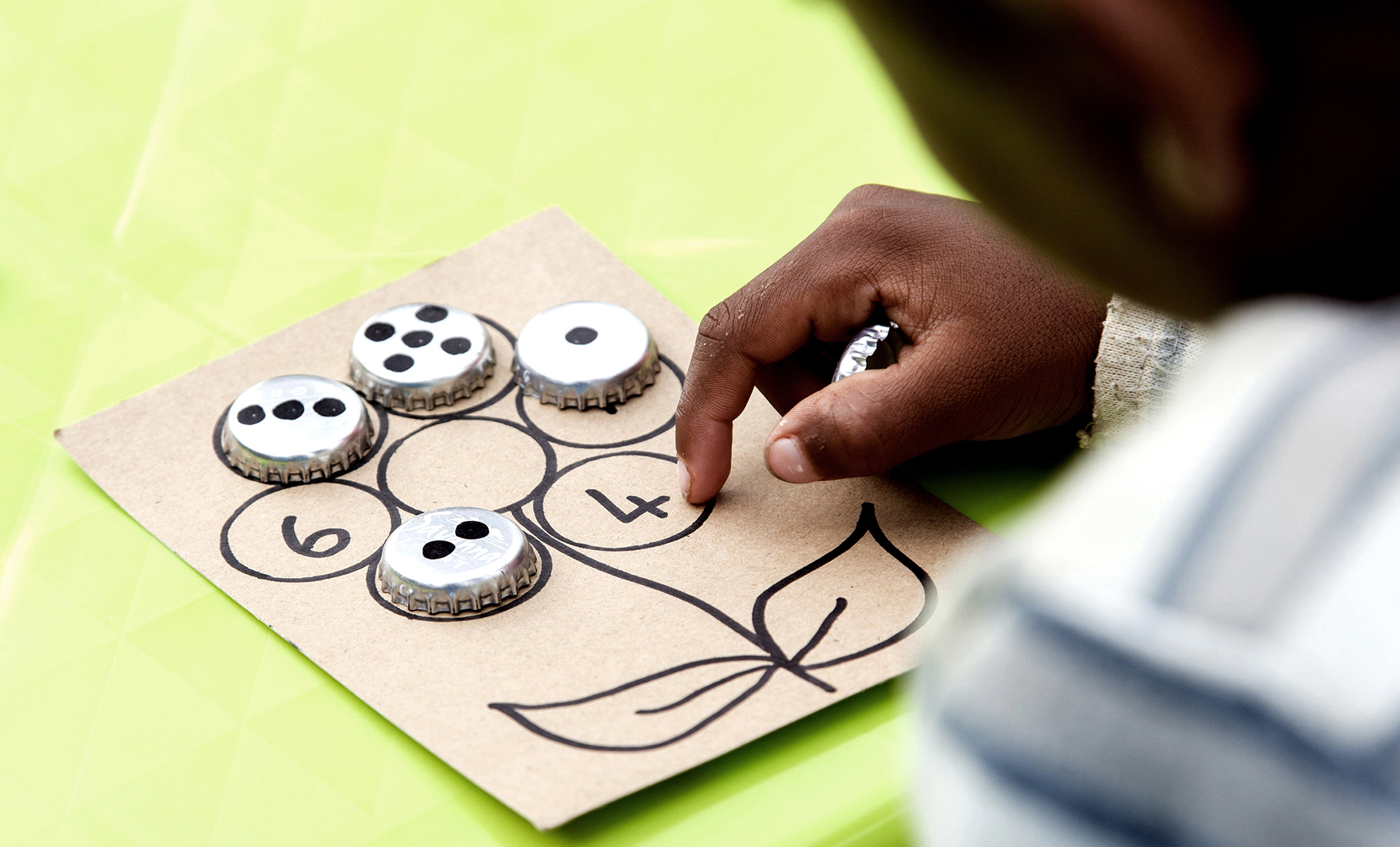
A five-year-old learns about numbers with a teaching aid made from metal bottle lids and a cereal box. (Photo: Travis Cottrell)
“The main objective is to provide young children with the opportunities to fully reach their potential to become productive members of society,” said Hay.
Prioritising play
Even before founding Singakwenza, Hay had accumulated more than two decades of teaching experience. She spent 11 years teaching in the junior primary and pre-primary phases before buying a Toptots Mother and Child franchise in July 2000.
Through this franchise, Hay taught mothers how to provide the stimulation necessary to help develop well-rounded children with a solid foundation for learning.
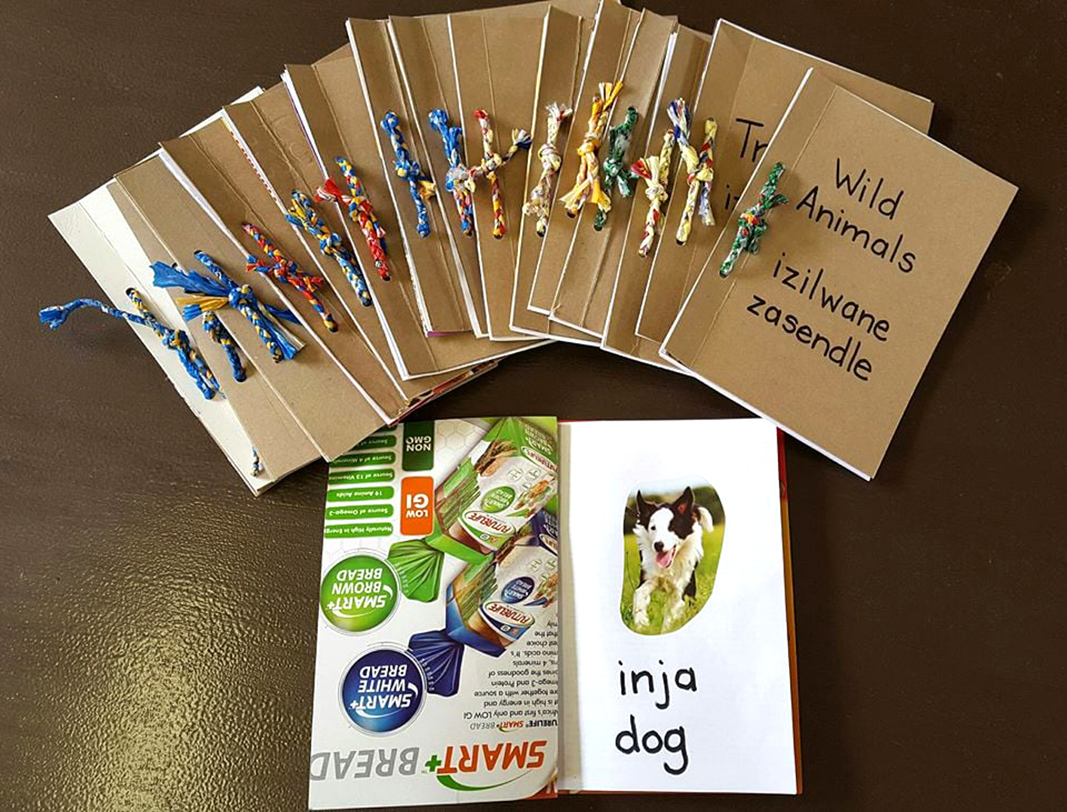
Through the Singakwenza ‘Waste 2 Toys’ training workshops, early childhood development practitioners learn how to make books using cereal boxes, scrap paper, bread bag ropes and magazine pictures. (Photo: Supplied / Julie Hay)
It was during this period that Hay became aware of the difference an ECD programme could make for children who faced social and financial disadvantages. In 2010, she sold the Toptots franchise and founded Singakwenza.
In addition to the Waste 2 Toys workshops, the NPO provides a training and mentorship programme in facilities such as daycares within a 150km radius of Pietermaritzburg. Training takes place in participating ECD centres for one day a week, every week, for two years, according to Hay.
“We take [the practitioners] from being mere babysitters, which is usually what they are employed to do, to becoming educators – so, play facilitators.”
The results of the Early Childhood Development Census 2021, released on 13 May 2022, showed that only 52% of teaching staff in early learning programmes have a relevant qualification, while 22% have no qualification.
Also, 54% of the early learning programmes surveyed as part of the census allowed fewer than 30 minutes of free play per day as part of the daily programme. When it comes to free play outdoors, 45% allowed under 30 minutes a day.
Read in Daily Maverick: “First early childhood development census reveals underfunded and underqualified sector”
“I am very aware of how many children in South Africa have limited access to, most importantly, adults who understand how important play is,” said Hay.
“The purpose of what we do is to try and make as many adults as possible understand the importance of play, understand how important their role is in play, and going forward, providing… [as] many different play opportunities as possible for children.”
Ruby Motaung, the vice-chairperson of the National ECD Alliance, told Maverick Citizen that play is the only effective way children learn, because it allows them to explore the world around them and different concepts in a fun manner.
“Toys make learning through [play] easy for children as they engage in hands-on learning. With toys, children can be actively engaged in all playful activities that they do indoors and outdoors,” she said.
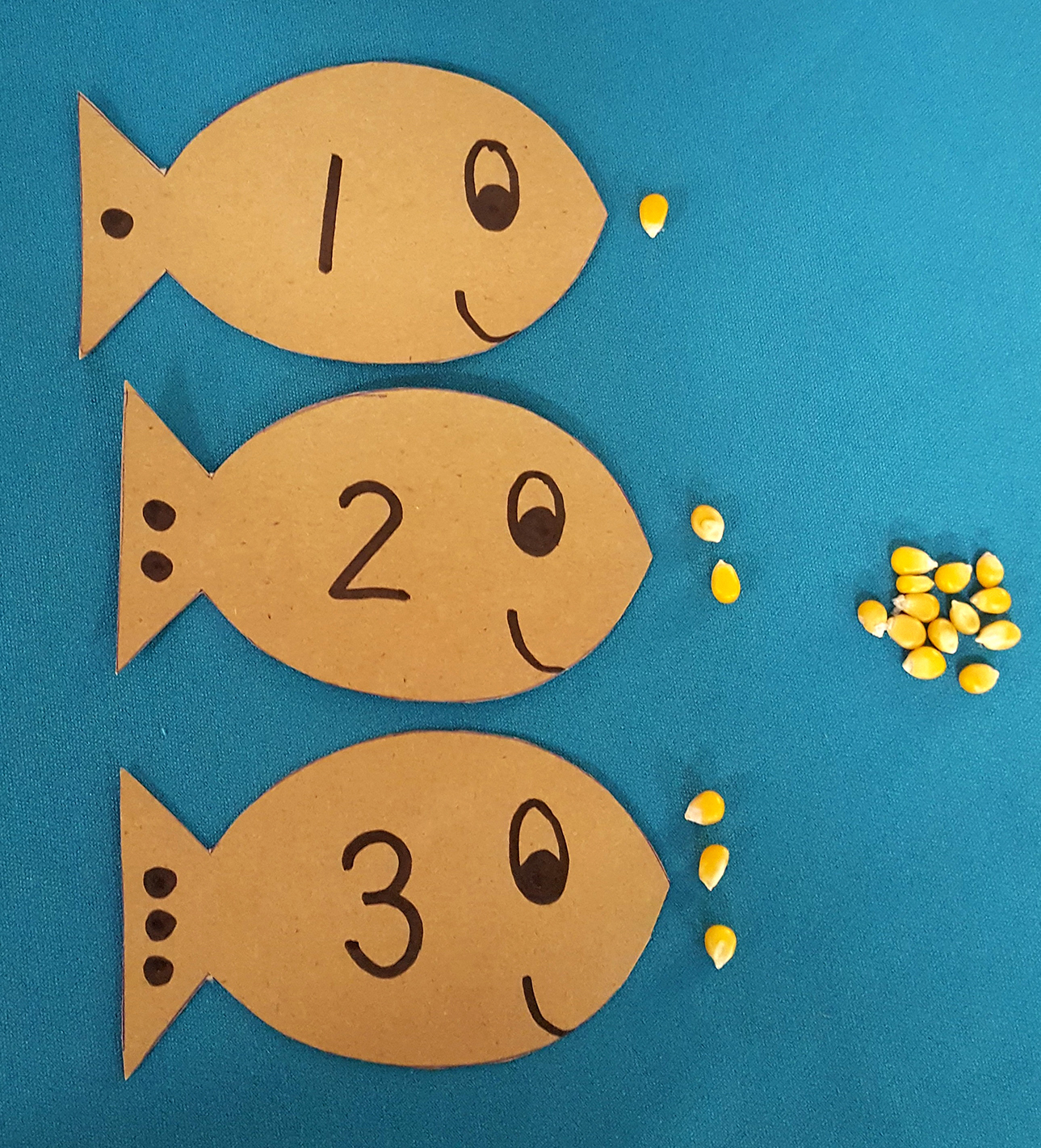
A teaching aid made from cereal boxes and corn is used to teach counting and one-to-one correspondence. (Photo: Supplied / Julie Hay)
Waste to toys
The success of Singakwenza’s Waste 2 Toys programme is rooted in the fact that it is simple and accessible to anyone, said Hay.
“The perception is that you have to be rich to be educated, and we’ve got to change that,” she said. “It goes against the consumerist mentality where you’ve got: ‘the more you pay, the more valuable it must be.’
“Our programme is about reaching as many parents or as many adults as possible, to help them to see they can do it. It is within their reach. And they don’t have to have fancy toys.”
People in Pietermaritzburg collect recycling and deliver it to Singakwenza’s office, where it is stored and later shared with other centres. The toys made from these materials help children in developing different skills.
Simple activities like sticking matchsticks into polystyrene trays can help develop a child’s tripod grip – a three-fingered pinch that allows them to hold a pencil properly later in life.
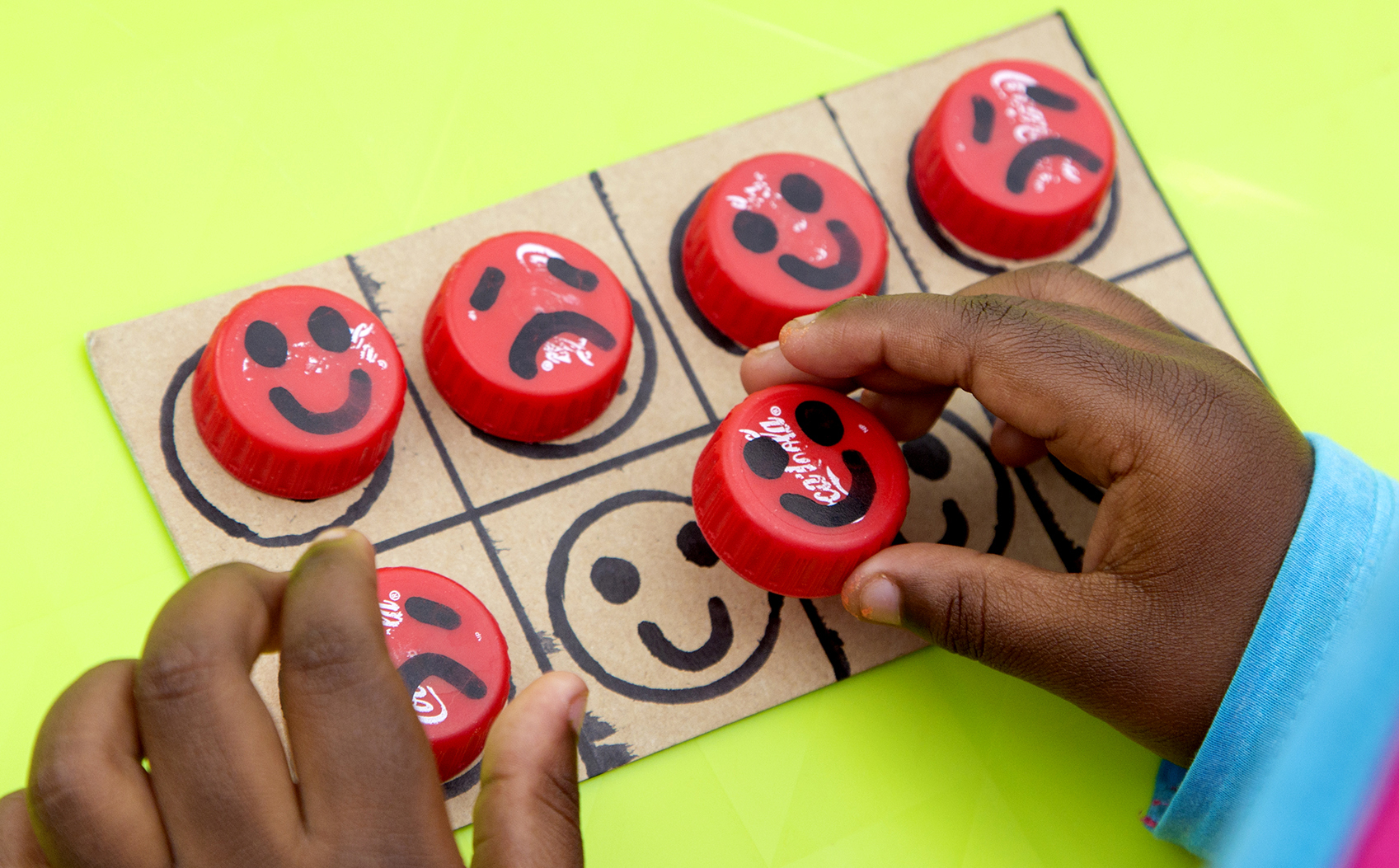
A teaching aid made from cardboard and bottle lids is used to play emotions bingo. (Photo: Travis Cottrell)
Threading a needle – made using a drinking straw and strands from a butternut pocket – through the holes in plastic bottle lids improves bilateral coordination.
A skipping rope made from plastic bread bags develops eye-foot coordination, body awareness and social skills.
“All of those skills are developed whether you’ve paid a lot of money for your [skipping] rope or not. So, Singakwenza is essentially trying to make access to many different play activities available to mainly impoverished communities,” said Hay.
The programme also teaches the making of books using cereal boxes and magazine pictures. The pages are tied together with string made from plastic bread bags.
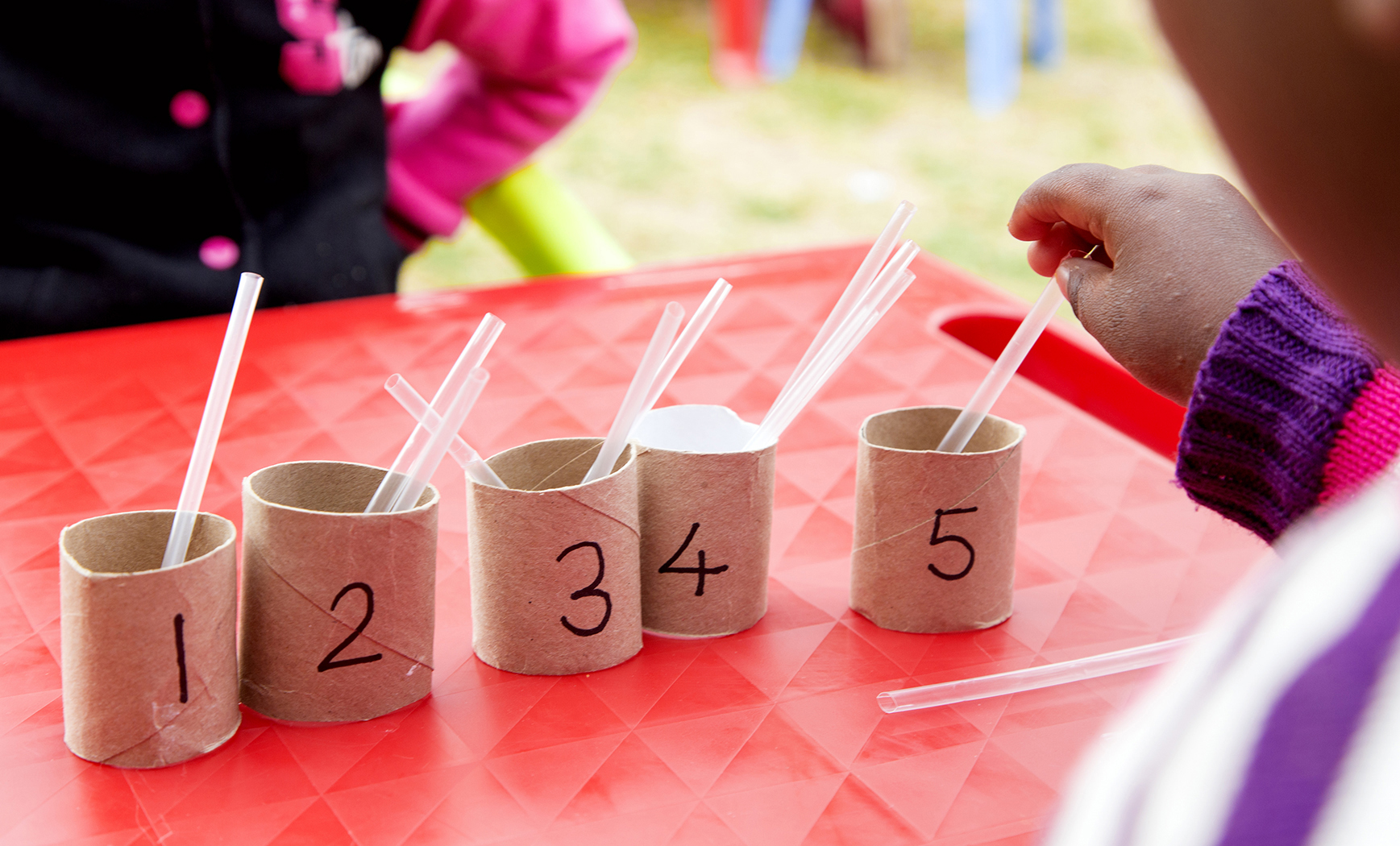
A child learns how many items a number symbol represents. (Photo: Travis Cottrell)
Accessing toys is often a challenge in low-income ECD centres, said Motaung, since there isn’t enough money to buy them. Those that can be afforded are usually too few for the entire group within a centre.
The benefit of a programme such as Singakwenza’s that teaches toy-making is twofold, she continued. It gives practitioners the skills to make toys, and allows them to pay nothing or very little to create these items.
“The ECD centres save on money, practitioners can facilitate playful learning and all children have toys to play with,” said Motaung.
Singakwenza offers a number of different three-hour Waste 2 Play workshops. These focus on a range of skills, such as gross motor and fine motor skills, stages and types of play, numeracy and language development. Between 10 and 25 people take part in each workshop, with two Singakwenza facilitators running each session, said Hay.
Safety and empowerment
Practitioners in poorly resourced centres often feel their “hands are tied” when it comes to providing quality education, according to Hay. The Waste 2 Toys programme is empowering, because it allows them to “kit out their own classrooms”.
This empowerment in turn allows practitioners to create a safe space for learners.

A teaching aid made of cereal boxes and bread bag rope is used to teach children how to tie their shoes. (Photo: Supplied / Julie Hay)
“I have seen first-hand the benefits of a positive relationship within which the child can feel safe, and I think that’s one of the things we’re trying to create,” said Hay.
“I went into one of my crèches the other day, and outside there are whoonga addicts, and there are unemployed people who are drunk at nine o’clock in the morning, there’s glass all over the road… but inside that crèche is this safe, happy place where the children are enthusiastic [and] the teacher really cares about them.
“Because [the teacher] knows what she’s doing, she feels empowered to provide them with a safe space, an enriching space.”
Mapule Chamane, a teacher of four- to five-year-olds at Umboni Crèche in Unit 14, Imbali township, attended a Singakwenza Waste 2 Toys workshop more than two years ago, and has since participated in the mentorship programme.
“It all becomes clear when you start working with the children and using those toys and the materials that you make out of waste,” said Chamane. “I got to realise that they’re not just waste… they can be helpful as well.”
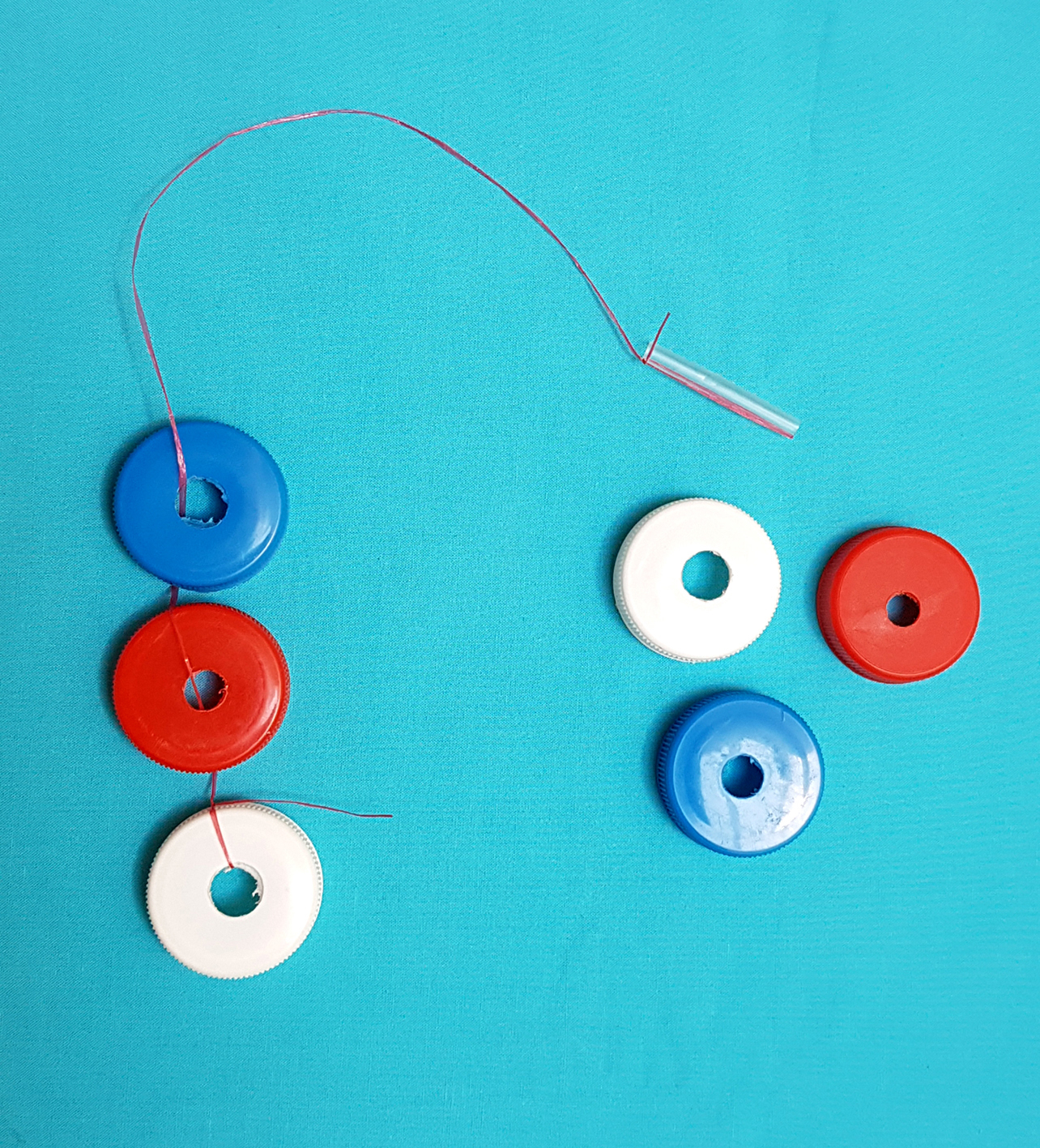
A threading game is created using milk lids, thread from a butternut pocket and a drinking straw needle. (Photo: Supplied / Julie Hay)
The Umboni Crèche struggled with access to toys and teaching materials before making items from waste, said Chamane. The recycled playthings have made teaching much easier.
“Every day, you have something to teach these children… even when you take them outside for playing… even if there’s no jungle gym, you don’t have swings… those children will have something to play with,” she said.
“[The children] enjoy it because to them it’s like learning while they are playing… and children love playing, and whatever is taught to them through play, I think that’s the idea that sinks in forever.” DM/MC




















 Become an Insider
Become an Insider
Comments - Please login in order to comment.